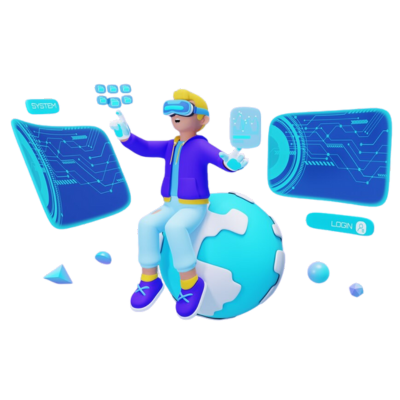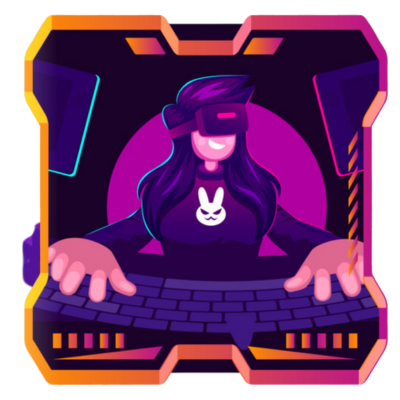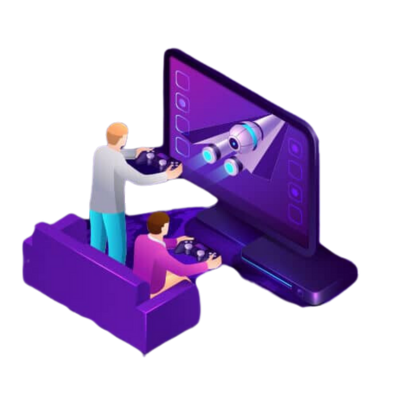Introduction
In the ever-evolving landscape of digital entertainment, Web3 games stand at the forefront of innovation, blending blockchain technology with immersive gameplay to create new experiences for players. A key element driving this revolution is the use of Non-Fungible Tokens (NFTs). NFTs have become the cornerstone of Web3 gaming, introducing a new era of digital collectibles that allow players to truly own, trade, and monetize their in-game assets. In this blog, we will explore the role of NFTs in Web3 games, delve into the technical aspects that make them unique, and discuss their impact on the gaming industry, particularly through the lens of Web3 gaming companies, Web3 game development firms, and players around the world.
Web3 Game Development Company
Work with a leading Web3 game development company to create the future of gaming.

Understanding NFTs and Their Significance in Web3 Games
What Are NFTs?
Non-Fungible Tokens (NFTs) are unique digital assets stored on a blockchain, representing ownership or proof of authenticity for a specific item or piece of content. Unlike cryptocurrencies such as Bitcoin or Ethereum, which are fungible and can be exchanged on a one-to-one basis, NFTs are unique and cannot be replaced with something else. Each NFT contains distinct information, making it valuable for representing rare or one-of-a-kind items in the digital world.
The Role of NFTs in Web3 Games
In the context of Web3 games, NFTs are used to represent in-game items such as characters, weapons, skins, virtual land, and more. These digital collectibles are owned by the players, not the game developers, allowing for true ownership and the ability to trade, sell, or transfer these assets across different platforms. This marks a significant shift from traditional gaming, where in-game assets are often controlled and restricted by the developers, providing limited value outside the game environment.
Why Are NFTs Important for Web3 Games?
NFTs are crucial for Web3 games because they enable a decentralised and player-driven economy. Players can own and control their assets, create value through gameplay, and participate in a vibrant secondary market. This not only enhances the gaming experience but also opens up new revenue streams for players and developers alike. For Web3 gaming companies, integrating NFTs into their games can lead to increased player engagement, retention, and monetization opportunities.
How NFTs Are Integrated into Web3 Games
Creating Unique Digital Assets
One of the primary ways NFTs are integrated into Web3 games is through the creation of unique digital assets. Each asset is represented as an NFT on a blockchain, ensuring its rarity and authenticity. For instance, in a fantasy Web3 game, a rare sword might be minted as an NFT, with only a limited number available. This scarcity increases the value of the item, making it highly sought after by players. Web3 game development companies use blockchain technology to mint these NFTs, ensuring that they are secure, tamper-proof, and easily transferable.
Interoperability Across Platforms
NFTs in Web3 games are not limited to a single game or platform. One of the most exciting features of NFTs is their interoperability across different games and platforms. This means that a player could use an NFT representing a character in multiple Web3 games, provided those games support the same standards. For example, a character NFT earned in one game could be used in another game developed by a different Web3 development company. This level of interoperability is a game-changer, providing a seamless experience for players and expanding the utility of NFTs beyond a single game environment.
Enhancing Player Ownership and Control
NFTs give players unprecedented ownership and control over their in-game assets. Unlike traditional games where developers can modify, remove, or restrict access to in-game items, NFTs are owned by the players and stored on a blockchain. This means that players have complete control over their assets, and developers cannot alter or revoke them. This ownership extends to the ability to trade, sell, or lease NFTs in secondary markets, allowing players to monetize their gaming experience. Web3 game platforms facilitate these transactions, providing a secure and transparent marketplace for digital collectibles.
Play-to-Earn Models and NFTs
Play-to-earn models have gained immense popularity in the Web3 gaming space, largely due to the integration of NFTs. In these models, players can earn NFTs through gameplay, which can then be sold or traded for cryptocurrency. This creates a new way for players to generate income by participating in Web3 games. Web3 game developers design these systems to reward players for their time and effort, creating a symbiotic relationship between gameplay and financial gain. The best Web3 games incorporate robust play-to-earn models, attracting a diverse and engaged player base.
Decentralized Marketplaces for NFTs
The rise of decentralized marketplaces has further amplified the role of NFTs in Web3 games. These marketplaces allow players to buy, sell, and trade NFTs without the need for intermediaries. Transactions are executed through smart contracts, ensuring that they are secure, transparent, and trustless. Web3 development firms are instrumental in creating these decentralized marketplaces, which are becoming essential components of the Web3 gaming ecosystem. Players can browse Web3 games lists, discover new collectibles, and engage in peer-to-peer trading, all within a decentralized environment.
Web3 Game Development Services
Work with a leading Web3 game development company to create the future of gaming.

Technical Aspects of NFTs in Web3 Games
Blockchain and Smart Contracts
At the core of NFTs in Web3 games is blockchain technology. Blockchains are decentralized ledgers that record all transactions in a secure and immutable manner. When an NFT is created, its details are recorded on a blockchain, making it tamper-proof and verifiable. Smart contracts are self-executing contracts that run on blockchain networks, automating processes such as NFT creation, ownership transfers, and royalty payments. Web3 game developers use smart contracts to manage the lifecycle of NFTs, ensuring that all transactions are transparent and trustworthy.
NFT Standards and Protocols
To ensure interoperability and consistency across different platforms, NFTs in Web3 games adhere to specific standards and protocols. The most widely used standard is ERC-721, which defines a set of rules for creating and managing NFTs on the Ethereum blockchain. Another standard, ERC-1155, allows for the creation of both fungible and non-fungible tokens within the same contract, offering greater flexibility for game developers. Web3 development companies in the USA and India leverage these standards to create NFTs that are compatible with a wide range of Web3 games and platforms.
Layer 2 Scaling Solutions
As the popularity of NFTs and Web3 games continues to grow, scalability has become a critical issue. High transaction fees and slow processing times on the Ethereum network can hinder the seamless experience that players expect. To address this, Web3 gaming companies are exploring Layer 2 scaling solutions, such as Polygon and Optimism, which offer faster and cheaper transactions while maintaining the security of the Ethereum blockchain. These solutions enable Web3 game development companies to create scalable NFT ecosystems that can support a large number of players and transactions.
Security and Anti-Fraud Measures
Security is a paramount concern in the world of NFTs and Web3 games. Since NFTs represent valuable digital assets, they are prime targets for hackers and fraudsters. Web3 game developers implement robust security measures to protect NFTs from theft, duplication, or unauthorized access. These measures include advanced encryption, multi-factor authentication, and decentralized storage solutions like the Interplanetary File System (IPFS). Additionally, smart contracts are audited by third-party security firms to identify and fix vulnerabilities before they are deployed on the blockchain.
The Impact of NFTs on the Gaming Industry
Redefining the Gaming Economy
NFTs have redefined the gaming economy by introducing a new layer of value creation and exchange. In traditional games, players spend money on in-game items, but these items hold little to no value outside the game. With NFTs, in-game assets become valuable digital collectibles that can be traded or sold for real money. This has led to the emergence of a new economy within the gaming industry, where players can earn a living through gameplay. Web3 game development services are focused on building these economies, providing players with opportunities to create and exchange value in novel ways.
Democratizing Game Development
NFTs have also democratised game development by enabling indie developers to create and distribute their games without relying on traditional publishers or platforms. By leveraging blockchain and NFT technology, independent developers can mint their own NFTs, create decentralised marketplaces, and engage directly with players. This has lowered the barrier to entry for game developers, fostering innovation and diversity in the Web3 gaming space. Web3 game development companies are increasingly collaborating with indie developers to bring their visions to life, contributing to a vibrant and dynamic gaming ecosystem.
Enhancing Player Engagement and Retention
The integration of NFTs in Web3 games has significantly enhanced player engagement and retention. Players are more invested in games where they have true ownership of their assets and the ability to earn rewards. The social aspect of trading and showcasing NFTs also adds a new dimension to player interaction, creating communities around shared interests and collectibles. Web3 game platforms that incorporate NFTs tend to have higher retention rates, as players are motivated to continue playing to grow their collections and participate in the game’s economy.
Creating New Revenue Streams for Developers
For Web3 game developers, NFTs represent a new and lucrative revenue stream. Developers can earn revenue through the initial sale of NFTs, as well as through royalties from secondary market transactions. Smart contracts can be programmed to automatically distribute a percentage of each resale to the original creator, ensuring a continuous stream of income. This has made Web3 game development an attractive industry for both established studios and indie developers. Web3 development firms are helping developers navigate this new landscape, providing the tools and expertise needed to monetize their creations effectively.
Challenges and Considerations in NFT Integration
Environmental Concerns
One of the most significant challenges associated with NFTs and blockchain technology is their environmental impact. The energy consumption of blockchain networks, particularly those using proof-of-work (PoW) consensus mechanisms, has raised concerns about the carbon footprint of NFTs. Web3 gaming companies are actively seeking solutions to mitigate these environmental effects, such as transitioning to more energy-efficient blockchains like Ethereum 2.0, which uses a proof-of-stake (PoS) consensus mechanism. Additionally, some Web3 development companies are exploring the use of carbon offsets to reduce the environmental impact of their projects.
Regulatory Uncertainty
The regulatory landscape for NFTs is still in its early stages, and there is significant uncertainty regarding how they will be classified and regulated in different jurisdictions. Issues such as intellectual property rights, taxation, and anti-money laundering (AML) compliance are complex and vary by region. Web3 game developers must navigate these regulatory challenges carefully to avoid legal pitfalls. This may involve working with legal experts and ensuring that their projects comply with local laws and regulations. As the industry matures, clearer guidelines are expected to emerge, providing more certainty for developers and players alike.
Market Volatility
The NFT market is known for its volatility, with prices for digital collectibles often experiencing dramatic fluctuations. This can pose risks for both players and developers, as the value of NFTs can rise or fall rapidly. Web3 gaming companies must manage this volatility by creating stable and sustainable in-game economies. This may involve setting limits on the supply of NFTs, implementing dynamic pricing models, or offering alternative rewards to balance the market. Web3 development firms play a crucial role in designing these systems, ensuring that the market remains healthy and that players are protected from extreme price swings.
Ensuring Long-Term Value
As the NFT market becomes more saturated, there is a growing concern about the long-term value of digital collectibles. Not all NFTs will retain their value over time, and some may become obsolete as new games and technologies emerge. Web3 game developers must focus on creating NFTs that offer lasting value, either through utility within the game, historical significance, or artistic merit. Additionally, developers should consider the lifecycle of their NFTs and plan for updates or enhancements that keep them relevant in the long term.
Level Up Your Web 3 Game! Get Expert Development Services Now!
Work with a leading Web3 game development company to create the future of gaming.

The Future of NFTs in Web3 Games
The Evolution of Digital Collectibles
As NFTs continue to evolve, we can expect to see even more innovative applications in Web3 games. Digital collectibles will become more sophisticated, offering dynamic features, interactive elements, and enhanced interoperability across multiple platforms. Web3 development companies will push the boundaries of what is possible with NFTs, creating new forms of digital art, music, and experiences that transcend traditional gaming.
Integration with Emerging Technologies
The future of NFTs in Web3 games will also be shaped by the integration of emerging technologies such as artificial intelligence (AI), virtual reality (VR), and augmented reality (AR). These technologies will enable the creation of more immersive and interactive NFTs, allowing players to engage with their digital collectibles in new and exciting ways. For example, VR-enabled NFTs could be displayed in virtual galleries, while AI-driven NFTs could evolve and change based on player interactions.
Expanding the Web3 Games List
As more developers and studios embrace NFTs, the Web3 games list will continue to expand, offering players a wider range of experiences and digital collectibles. The best Web3 games will seamlessly integrate NFTs into their gameplay, creating cohesive and engaging worlds where players can express themselves through their collections. Web3 gaming companies will play a crucial role in curating and promoting these games, ensuring that players have access to high-quality and innovative experiences.
Building Sustainable and Inclusive Economies
The future of NFTs in Web3 games will also involve building sustainable and inclusive economies that benefit all participants. This includes creating opportunities for underrepresented groups, ensuring fair distribution of rewards, and promoting responsible consumption of digital assets. Web3 game development companies must prioritise ethical considerations in their projects, fostering a gaming ecosystem that is both profitable and equitable.
Conclusion
NFTs are transforming Web3 games by giving players true ownership of digital collectibles, creating new value and monetization opportunities. Blockchain technology, smart contracts, and decentralized marketplaces are redefining how in-game assets are created, owned, and traded. Web3 gaming companies, developers, and players are leading this change, driving innovation in digital entertainment.
Despite their potential, NFTs face challenges such as environmental impact, regulatory uncertainty, and market volatility. Addressing these issues will be crucial for Web3 development firms as they explore new possibilities. The future of NFTs in Web3 games is promising, with vast opportunities for creativity, innovation, and economic growth. How Smart Contracts Are Revolutionizing Web3 Games



